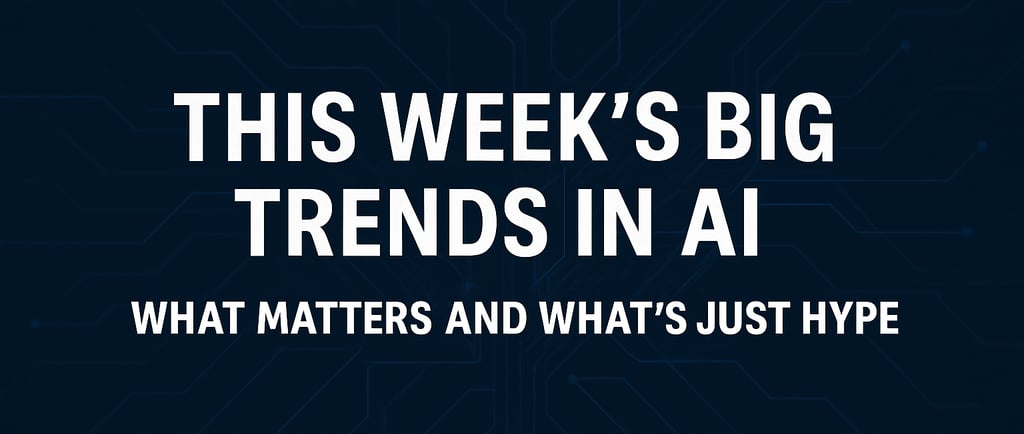This Week’s Big Trends in AI: What Matters and What’s Just Hype
Explore this week’s top AI trends: open-source agents, GPT-4o voice cloning concerns, VC bets on agent infra, and AI-written sci-fi that actually impresses.
Shannon McDowell
7/30/20253 min read


This Week’s Big Trends in AI: What Matters and What’s Just Hype
Every week in AI feels like a caffeine-fueled sprint through the future—but this one? It came with guardrails, funding rounds, and a handful of existential dread.
From voice-cloning drama to surprisingly deep Reddit debates about tiny models with big ambition, the week’s developments reveal where the industry is heading... and where it might trip over itself.
Let’s unpack the five trends shaping AI right now—and what’s real, what’s risky, and what’s just riding the hype train.
1. Open-Source Agent Ecosystems Are Leveling Up
The agent wars aren’t just a closed-source story anymore. This week, Microsoft released AutoGen 2.0, a major upgrade to its open-source multi-agent framework [AutoGen GitHub, July 2025].
“Agent communication is now fully modular, with groupchat-style memory and tool-use baked in,” said Dr. Shuoheng Zhang, project lead at Microsoft Research.
The update enables agents to share tools, debate outcomes, and split tasks across workflows—features previously reserved for high-end proprietary stacks like Devin or CrewAI Pro.
Meanwhile, a widely shared Arxiv paper (July 25, 2025) titled "Scaling Multi-Agent Cooperation via Shared Embeddings" demonstrated performance gains in real-world benchmarks like PDF extraction, task decomposition, and planning.
Why it matters: Open-source agents are closing the capability gap—fast. The barrier to entry for startups and researchers just got dramatically lower.
2. Tiny Models Are Punching Above Their Weight
A Reddit thread on r/MachineLearning titled “TinyLLaMA-1.1B Hits 60% on MMLU—How Far Can We Go?” sparked over 800 comments and some surprising optimism.
TinyLLaMA, a distilled version of Meta’s LLaMA architecture, scored 60.7% on MMLU, up from just 42% in April.
One top comment summarized the mood: “This will be the Raspberry Pi moment for LLMs—cheap, hackable, and just good enough.”
Others were more cautious:
“Compression isn't free,” warned user u/MLDrainage. “You’re trading reasoning depth for inference speed.”
Why it matters: As the edge-AI movement gains momentum, these distilled models could redefine what’s possible on-device—especially for privacy-first applications or offline agents.
3. GPT-4o Voice Cloning Sparks Legal and Ethical Whiplash
A viral Hacker News post this week featured a demo of GPT-4o mimicking the voice of Morgan Freeman during a mock podcast interview. It was chillingly accurate—and it reignited the deepfake debate.
OpenAI insists that safeguards like watermarking and opt-in consent are active, per their June 2025 policy memo.
Yet scams are already surfacing: A LinkedIn post from cybersecurity firm SentinelOne cited a $400K wire fraud case involving a cloned CEO voice during a video call.
The legal gray area is shrinking:
“Voiceprints are biometric data,” said Sarah Dillard, an AI policy researcher at Stanford. “Laws like Illinois’ BIPA are already being tested in court.”
Why it matters: We’ve crossed the uncanny valley and are now sprinting into litigation land. Expect fast-moving regulatory crackdowns—and possibly lawsuits—before the year’s end.
4. VCs Are Going All-In on Agent Infrastructure
While the general public obsesses over chatbots and AI girlfriends, venture capitalists have shifted their gaze to the unsexy but essential infrastructure layer.
Composable Systems, a startup building agent middleware for enterprise workflows, raised $34 million Series A this week led by a16z.
Over 60 agent-focused startups have launched since April 2025, per AngelList data.
Andreessen Horowitz called this “The Agent Operating System Era” in a blog post on July 24.
Key areas of funding include:
Long-term memory orchestration
Cross-agent communication protocols
API integration layers for secure tool use
Why it matters: In the same way Twilio quietly powered the SMS boom, agent middleware could be the next goldmine. Follow the boring money—it tends to know where things are headed.
5. AI-Generated Sci-Fi Is Now a Creative Benchmark
A Stanford/Hugging Face study published this week compared stories written by GPT-4, Claude, and Mixtral with submissions from amateur human writers on Royal Road and Archive of Our Own.
GPT-4’s stories were rated “more coherent and immersive” than 60% of human entries by a panel of sci-fi editors and fans.
Not everyone was impressed:
“It reads like good fanfic written by a machine that’s never been heartbroken,” quipped author Salina Yeo in a blog response.
Still, the implications are big: AI is now capable of generating entire story arcs, including characters, world-building, and internal conflict.
Why it matters: Creative writing is becoming a benchmark task for evaluating model reasoning, coherence, and long-form consistency. The line between AI collaborator and ghostwriter is fading.
Final Thoughts: Reality, Regulation, and the Road Ahead
This week revealed a pattern: AI isn’t just moving fast—it’s building momentum in all directions. From serious infrastructure bets to sci-fi creativity to risky voice tech, we’re seeing the infrastructure, ethics, and intelligence of AI systems collide in real time.
We’re past the prototype phase. What comes next is implementation—and accountability.
So, is it hype? Sometimes. But it’s also history-in-progress.
Transformative AI Solutions
© 2025. Transformative AI Solutions.
All rights reserved.
Contact: admin@transformativeaisolutions.com
Legal